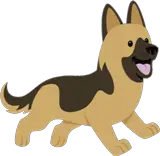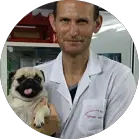Introduction
The Poitevin Dog, an exceptional breed known for its endurance and scenting ability, offers a unique combination of loyalty, intelligence, and elegance. Revered in their native land of France, they have captured the hearts of dog enthusiasts worldwide. The breed traces its roots back to the late 17th century, a creation of the Marquis de Larrye. These dogs were bred for hunting and have maintained their incredible stamina and tracking skills throughout the centuries.
| Feature | Description |
|---|---|
| Breed Name | Poitevin |
| Origin | France |
| Größe | Groß |
| Gewicht | 55 – 71 lbs |
| Farbe | Black and white mix, often appearing bluish with possible patches of tan |
| Lebenserwartung | 10-12 years |
| Temperament | Alert, Courageous, Energetic |
| Diät | High-quality dog food suitable for size and age, rich in protein |
| Exercise Needs | High – requires regular vigorous exercise |
| Pflege | Regular brushing of the short, smooth coat |
| Health Issues | Generally healthy, some prone to hip dysplasia and bloat |
| Best Suited For | Active families or individuals with access to ample outdoor space |
Physical Characteristics of Poitevin Dog
Size and Weight
Poitevins are large dogs, standing tall with a regal bearing. Adult males typically weigh between 66 and 71 lbs, and females between 55 and 65 lbs, providing a commanding yet elegant presence.
Coat and Color
Their coat is short and smooth, perfect for outdoor adventures. The color is quite distinctive, usually featuring a mix of black and white, giving a bluish appearance, with some having patches of tan.
Other Distinctive Features
One of the most notable features of the Poitevin is their expressive eyes, which can range from dark brown to lighter hazel. Their large, hanging ears add to their character, and their muscular build speaks to their hunting heritage.
Poitevin Dog Temperament and Personality Traits
General Behavior
Poitevins are known for their tenacious yet gentle nature. They are highly intelligent dogs, eager to please, and enjoy participating in family activities.
Interaction with Humans and Other Animals
They are sociable dogs who get along well with humans, including children. With proper socialization, they can also be comfortable around other dogs and pets.
Common Temperament Traits
Poitevins are alert, courageous, and energetic. They are often seen as confident dogs with a lively and outgoing nature, which complements their hunting heritage.
Training and Behavior Management of Poitevin Dog
Training Requirements
Given their intelligent nature, Poitevins respond well to training, particularly when positive reinforcement techniques are used. Consistency is key when training this breed.
Socialization Needs
Socialization is crucial for Poitevins, as it helps them adapt to various environments and situations. Regular exposure to different people, pets, and experiences is beneficial.
Tips for Effective Training
Positive reinforcement and reward-based training work best with this breed. Patience, consistency, and understanding their innate drive to hunt will lead to successful training outcomes.
Poitevin Dog Exercise and Physical Activity
Daily Exercise Requirements
Poitevins require regular, vigorous exercise due to their high energy levels. Daily walks, coupled with playtime and opportunities to run, are vital.
Suitable Activities for Poitevin Dogs
Outdoor activities such as running, fetching, and tracking games are ideal. Any activity that allows them to explore and exert their energy will be beneficial.
The Importance of Mental Stimulation
Poitevins, like all dogs, also need mental stimulation. Puzzle toys, obedience training, and tracking games can all help to keep their minds sharp.
Health and Lifespan of Poitevin Dog
Average Lifespan
Poitevins typically enjoy a healthy lifespan of around 10-12 years when given proper care and a balanced diet.
Common Health Issues
The Poitevin is generally a healthy breed, but they can be prone to certain conditions like hip dysplasia and bloat. Regular vet check-ups are crucial in maintaining their health.
Preventive Health Care Measures
Routine veterinary check-ups, balanced nutrition, regular exercise, and timely vaccinations play a significant role in preventing health issues and ensuring a long, healthy life for Poitevin dogs.
Nutrition and Diet for Poitevin Dog
Dietary Needs
Poitevins need high-quality dog food appropriate for their size and age. A diet rich in protein supports their energy levels, while a balanced amount of carbohydrates, fats, vitamins, and minerals ensures overall health.
Feeding Schedule and Amounts
Feeding schedules may vary based on age, health, and activity level. Usually, two meals per day are recommended for adult Poitevins.
Common Food Allergies and Sensitivities
Though not overly common, some Poitevins may develop food allergies or sensitivities. If symptoms like itching, digestive issues, or skin problems are noticed, a vet should be consulted.
Grooming and Maintenance of Poitevin Dog
Grooming Requirements
The Poitevin’s short coat is relatively easy to maintain. Regular brushing will keep their coat healthy and minimize shedding.
Bathing and Coat Care
Bathing should be done as needed, usually once every few months. It’s also essential to check their coat regularly for ticks or fleas, particularly if they have been out hunting or in wooded areas.
Nail, Ear, and Teeth Care
Routine nail trimming, ear cleaning, and teeth brushing are necessary to keep your Poitevin healthy and comfortable. Any signs of infection or discomfort should be immediately addressed with a vet.
Living Conditions and Suitability for Poitevin Dog
Ideal Living Conditions
Given their size and energy levels, Poitevins do best in homes with ample outdoor space. They are not well-suited for apartment living.
Suitability for Families, Singles, and Seniors
This breed can adapt well to different households, but due to their high energy levels, they are particularly suitable for active individuals or families.
Compatibility with Other Pets
With early socialization, Poitevins can get along well with other pets. However, due to their hunting background, they might see smaller animals as prey, so supervision is advised during interactions.
Poitevin Dog Breeding and Puppies
Breeding Information
Responsible breeding is crucial for maintaining the health and temperament of the Poitevin breed. Prospective breeders should be well-versed in the breed’s characteristics and potential health issues.
Caring for Poitevin Puppies
Poitevin puppies require ample socialization and training from a young age. Regular vet check-ups, a balanced diet, and lots of love are also key to their well-being.
Key Developmental Stages
Understanding the key developmental stages of a Poitevin puppy helps in providing appropriate care and training at each stage. These include the socialization period, the juvenile period, and the adolescence period.
Rescue Groups and Adoption for Poitevin Dog
Finding a Poitevin Dog for Adoption
While it may take some time and patience, there are rescue groups and shelters where you can adopt a Poitevin dog. Online resources can help you locate these.
The Adoption Process
Adopting a Poitevin usually involves an application process, an interview, and sometimes a home visit. It’s a worthy process to ensure these wonderful dogs find loving homes.
Tips for Bringing a Rescue Dog Home
Patience and preparation are key when bringing a rescue dog home. Providing a quiet space for your new pet and slowly introducing them to their new surroundings can ease their transition.
Schlussfolgerung
Owning a Poitevin dog can be a truly rewarding experience. Their loyalty, energy, and intelligence make them wonderful companions. However, their high energy levels and need for exercise present some challenges, particularly for those living in apartments or leading a sedentary lifestyle. The Poitevin dog is a beautiful, unique breed. They may not be the best fit for everyone, but for those who lead an active lifestyle and appreciate the breed’s history and traits, a Poitevin can be a wonderful addition to the family.


